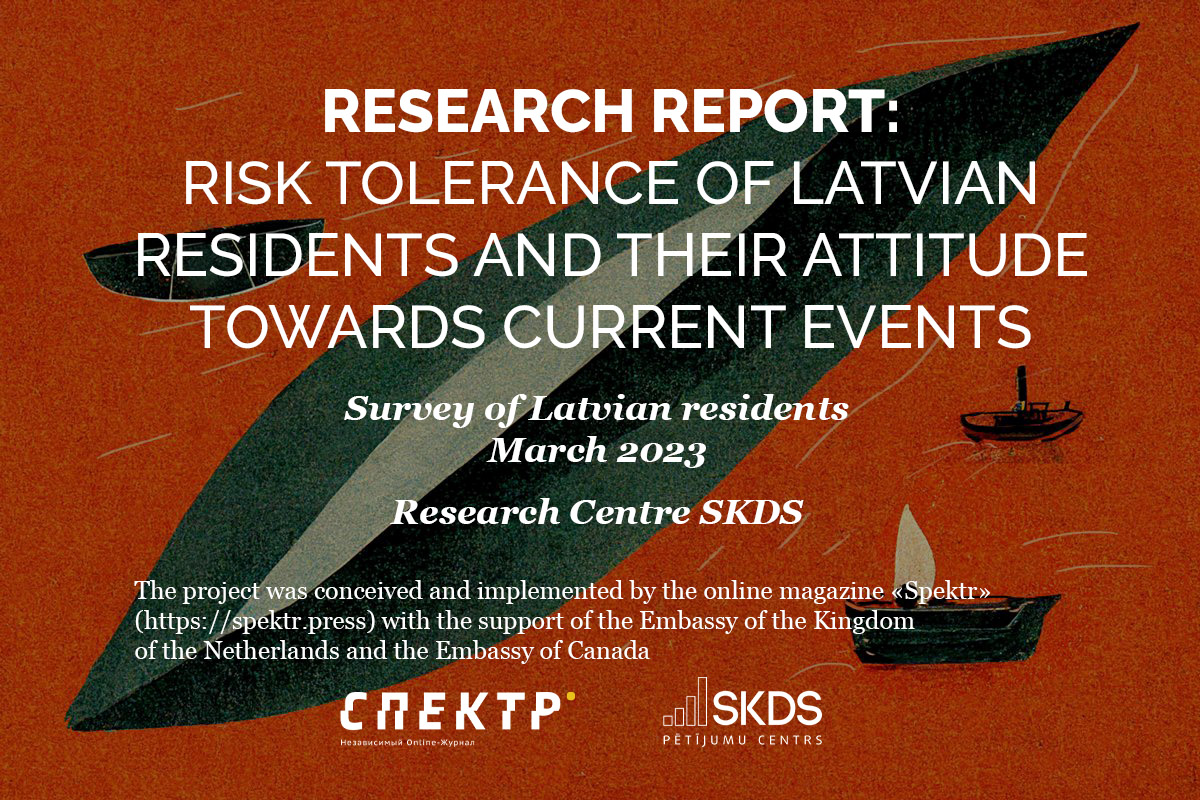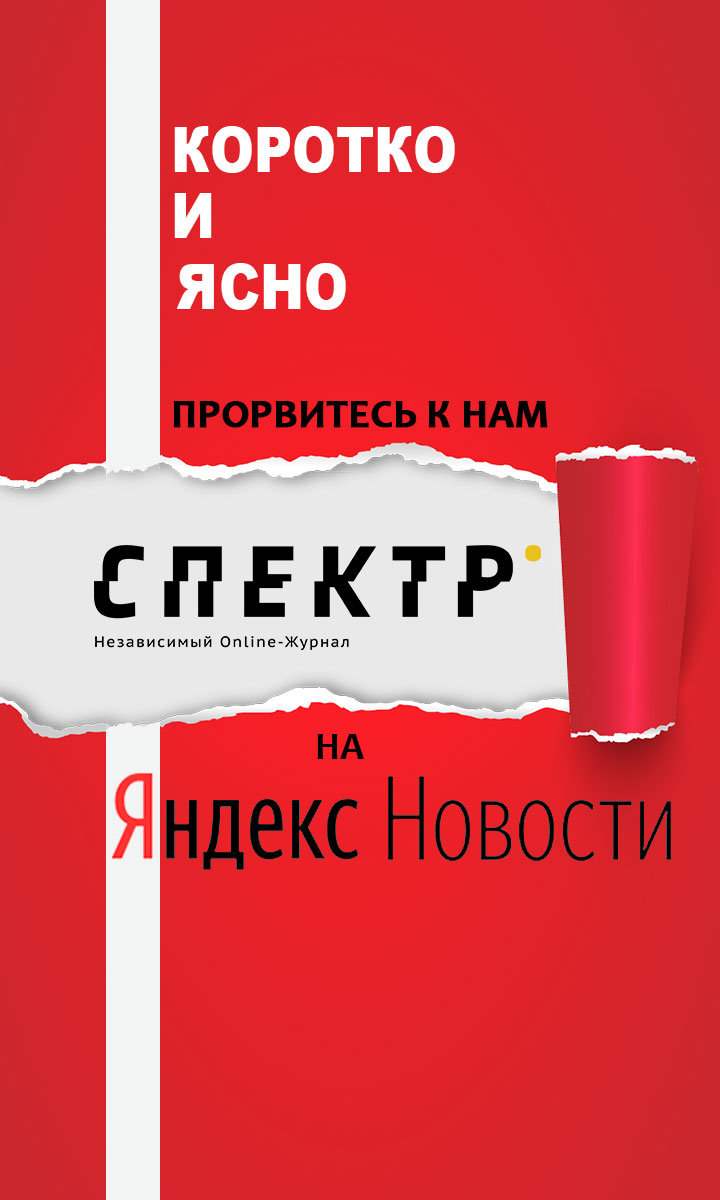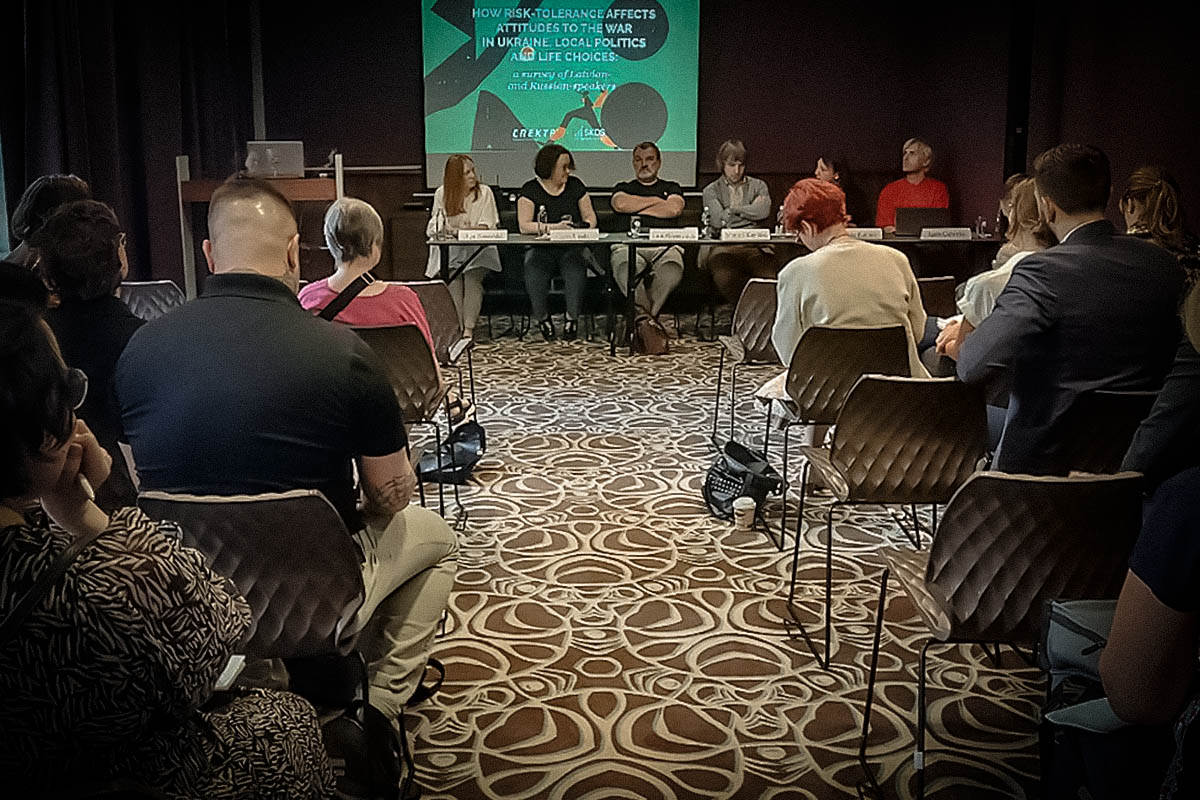 Expert discussion «How risk tolerance in Latvia influences attitudes towards war in Ukraine, politics and life decisions of its inhabitants». Photo Spektr. Press
Expert discussion «How risk tolerance in Latvia influences attitudes towards war in Ukraine, politics and life decisions of its inhabitants». Photo Spektr. Press
You can read this publication in RUS and LAT
The magazine «Spektr», together with the independent sociologist Olga Procevska and the Latvian Public Opinion Research Center SKDS, conducted a survey entitled «Risk Tolerance of Latvian residents and Their Attitude towards Current Events».
The magazine Spektr, together with the independent sociologist Olga Procevska and the Latvian Public Opinion Research Center SKDS, conducted a survey entitled «Risk Tolerance of Latvian Residents and Their Attitude towards Current Events». This survey was carried out with the support of the Embassy of the Netherlands and the Embassy of Canada in Latvia. A discussion, at which prominent representatives of the academic community of Latvia — sociologists, anthropologists and philosophers — spoke out, was held based on the results of the study. Most of all, the participants were interested in what a third of Russian-speakers who refused to answer painful questions of guilt and responsibility really thought.
The survey was based on two nationwide surveys conducted in Latvia in March 2023 — face-to-face (1020 respondents) at the place of residence and online (1231 respondents) with a representative sample (i.e., representing a cross-section) of 18 to 75 years of age. Of the total number of respondents, 1191 have Latvian as their mother tongue, and another 1039 are Russian speakers (who speak Russian in the family). The authors set out, firstly, to study how the attitude of Latvian residents has changed to current events in the country and, especially, to the war in Ukraine. Secondly, they have measured the degree of readiness of Latvian residents to risk and found out how it is formed and what it subsequently affects. The initial hypothesis is the widespread opinion that Russian-speakers, perhaps due to the limited possibilities of public service, are more active and successful in business than Latvians. It turns out that this myth, widespread in the Russian-speaking environment, has not been tested by practical research.
Main conclusions
In the last discussion, Olga Procevska outlined the main conclusions of the study . It has turned out that Russian-speaking residents of Latvia mainly obtain information from Russian-speaking commercial Latvian media and social networks. They, especially young people, still want to use information in Russian, but are skeptical of the media controlled by the Russian authorities. Interestingly, they don’t feel much love for Latvian public media in Russian either.
Latvians traditionally support NATO and the EU, while Russian speakers are more skeptical about these associations. Young, educated, and risk-averse Latvians experience more Euro-optimism than other groups. The level of income significantly affects the attitude towards these organizations: the richer people are, the more support. This is especially true for Russian speakers.
It is interesting to compare these figures with data from more than two years ago. In 2020, the online magazine Spektr and the Public Opinion Research Center SKDS, with the support of the Embassy of the Netherlands and the Embassy of Sweden in Latvia, conducted a sociological study that showed that the vast majority of Russian-speaking residents of Latvia — 73 percent — are Europeans in their views, and perceive themselves that way. At that time, Latvia’s membership in the EU was satisfied by 70% of the surveyed Russian-speaking residents of the country (today this indicator has decreased and is 65%) and only 32% of respondents were satisfied with joining NATO at that time (by 2023 this indicator has increased by 9 percentage points and currently stands at 41%).
The researchers have finally received reasonable confirmation of the widespread opinion that «Consent» (Soglasie) lost the last parliamentary elections due to an insufficiently pro-Russian position. Mainly because they did not protect Russian schools and stand up for the monument to Soviet soldiers of the Second World War in Victory Park in Riga (dismantled by the decision of the Latvian authorities in October 2022).
As for the attitude of residents to the war in Ukraine, the most important finding here is that Russian speakers tend to hide their attitude to it. The number of respondents who have refused to give an answer is much higher than usual. Moreover, the number of those who hide their opinions differs sharply among Latvian and Russian-speaking respondents. Among the latter, 28 percent found it «difficult to say» whether the events in Ukraine were an act of aggression by Russia or whether Russia was forced to defend its interests there.
It is also found that Latvians live in more homogeneous social «bubbles» than Russian speakers. A large number of respondents whose family language is Russian have answered that among their relatives and friends the same number of people support both sides.
Risk tolerance
The second part of the study is devoted to the measurement of «risk tolerance “, which is often defined as the propensity for risky decisions (e.g., in finance, business, politics, but not limited to). According to the survey results, the respondents were divided into three groups: «risky», «risk-averse» and «others». It has turned out that risk tolerance strongly depends on the family background. There are fewer willing to take risks among the poor than among the rich. Among poor Latvians, there are 10 percent of them. Among poor Russians — eight percent.



Source: «Research report: risk tolerance of Latvian residents and their attitude towards current events”/ Spektr. Press / SKDS
Low risk tolerance (i.e. unwillingness to take risky decisions) negatively affects entrepreneurial activity. As it has turned out, this activity is highest among Latvian-speaking residents of the country who are ready for risky actions — the highest proportion of entrepreneurs and self-employed — 15 percent — was found among risk-prone Latvians.
«Risk takers» generally have a higher income than risk avoiders. Among the latter, there are noticeably many people coming from poor families. According to Procevska, the trend is as follows: people who are born poor remain so. «Risk takers» are more likely to vote for new political parties. Russian-speaking risk takers helped the populist party «Stability!» be member of the parliament The researcher was surprised that risk–averse Russian speakers were more likely to support Russia in the war with Ukraine — 42% versus 38% of «risky» Russian speakers. Among Latvians, who are less inclined to take risks, the trend is predictably reversed.
Different points of view
Ieva Strode, co-author of the study, Head of the Department of Social and Political Research at SKDS, admitted that she was glad to have the opportunity to consider the Russian-speaking minority from an unexpected angle. «Education, income, language and region are common criteria for analyzing the population, especially Russian speakers,» the researcher said. — They sometimes seem to be a single homogeneous group, «all Russians are the same.» Of course, they are different, and I would like to consider them in more detail from the point of view of lifestyle, trends like the environmental movement, political activity. Or risk tolerance.»
Aivita Putniņa, Head of the Department of Anthropology at the University of Latvia, expressed surprise that the authors combined risk-taking and entrepreneurship with an ethnolinguistic factor. These factors don’t seem interdependent to me,— she says. — But the attitude to risk and entrepreneurial activity, unlike political preferences, are significantly influenced by gender. And we would rather see here not an ethnic division, but a division by gender». At the same time, it should be noted that the relationship between the willingness to risk and the involvement of respondents in entrepreneurial activity in the results of the study can be traced quite clearly.
In Latvia, she explains, there is a rather small percentage of women in parliament, for example, and in the field of decision-making in general: «And also in terms of risk perception, Latvia has a traditionally male society. We have a masculine culture, and masculinity is associated with a high willingness to take risks.» According to Putniņa, this study also suggests that risk-taking, poverty and addictions are not unidirectional processes. Taking risks does not always lead to entrepreneurship, but sometimes to dangerous habits. Although many entrepreneurs manage to turn their behavioral dependence on risk into a business — for example, this can be observed on the stock exchange. In other words, the propensity for risky decisions by itself does not necessarily determine the path of personal development as a businessman or entrepreneur. However, the results of the study can show that the share of entrepreneurs is consistently higher among those who have shown their propensity for risk.
In Latvia, she explains, there is a rather small percentage of women in parliament, for example, and in the field of decision-making in general: «And also in terms of risk perception, Latvia has a traditionally male society. We have a masculine culture, and masculinity is associated with a high willingness to take risks.» According to Putniņa, this study also suggests that risk-taking, poverty and addictions — are not unidirectional processes. Taking risks does not always lead to entrepreneurship, but sometimes to dangerous habits. Although many entrepreneurs manage to turn their behavioral dependence on risk in business — for example, this can be observed on the stock exchange. In other words, the propensity for risky decisions by itself does not necessarily determine the path of personal development as a businessman or entrepreneur. However, the results of the study can show that the share of entrepreneurs is consistently higher among those who have shown their propensity for risk
The panelists have also discussed why in Latvia poverty does not lead to protests. Ieva Strode recalled the well-known formula in sociology: «People don’t protest when they feel bad. They do this when they have the resources to protest: money, skills, support groups, etc. This applies both to expressing opinions and to more active actions. Now people don’t have enough resources, and that’s why they don’t protest.

Source: «Research report: risk tolerance of Latvian residents and their attitude towards current events”/ Spektr. Press / SKDS
Philosopher, publicist, associate professor and leading researcher at the University of Latvia, editor of the online magazine Satori Igor Gubenko drew the attention of the debaters to the fact that poor residents of Latvia, judging by their behavior, poorly represent their interests and do not defend them. «They do not support the parties that represent them, — the philosopher clarifies. — They have no class consciousness. Therefore, despite our poverty, we do not have a left-wing political movement.»
A researcher at the Institute of Philosophy and Sociology of the University of Latvia, an expert at the Center for European Policy Analysis Mārtiņš Kaprāns has noted a provocative fact, according to him, that is both obvious and ignored by Latvian media policy: 60 percent, in fact two thirds, of Latvian Russian-speakers get information about what is happening in Latvia and the world from the Latvian Russian-language commercial media. At the same time, 45 percent can be attributed to bilinguals in everyday media consumption. The share of bilingualism in Latvian society is growing — and this is a steady trend. It is more typical for young people.

Source: «Research report: risk tolerance of Latvian residents and their attitude towards current events”/ Spektr. Press / SKDS
However, although this indicator correlates with age, it is not necessarily explained by it, the researcher believes: for example, it grew after the annexation of Crimea. That is, it turns out that, having the opportunity to read in Latvian, people still prefer the media in their native language. «I think, we have a very strong temptation to view this data through the prism of recent events in Latvian media policy and intentions to exclude Russian—language content from public broadcasting,» says Kaprans. — How can we evaluate such a strategy of the authorities? Clearly as not very profitable for all parties.»
«Let’s be honest, this is a stupid strategy,» says Juris Rosenvalds, a leading researcher at the Institute of Social and Political Studies at the Faculty of Social Sciences of the University of Latvia, bluntly. — Especially in comparison with our neighbors. As a reaction to the war in Ukraine, they allocated one and a half million to the Russian-language media, and here [the Minister of Culture of Latvia] Mr. Puntulis suggested that Russian journalists look for another job.»
Rosenwalds does not agree that bilinguals are only young people. He reminded the audience about the study of the relationship between ethnolinguistic groups carried out by the Professor Martin Ehala of the University of Tartu in 2012. The survey showed an interesting trend: the bilingual cultural space in Lithuania and Estonia then accounted for 17 percent of the population. And in Latvia — 40 percent! «It’s not just because Russians are learning Latvian, but also because Latvians use the Russian cultural space, for example, the Russian theater, the media,» the scientist stressed.
Igor Gubenko has noted that researchers often overlook the problem of culture consumption. «We are constantly talking about the media, about what language they are in, but it is interesting that with concerts, different types of entertainment, how it correlates with political issues that, at first glance, are completely unrelated to this,» he says.
About those who kept silent
Particular attention of the participants of the discussion was attracted by the group of Russian-speaking respondents who refused to give answers to the most painful questions of the current political agenda. It turned out to be too large (depending on the question, the position «I can’t say» is occupied by from a quarter to a third of respondents) so that the lack of an answer could be attributed to the lack of a position.
In particular, 28 percent of Russian-speaking respondents refrained from answering the question whether to regard what is happening in Ukraine as an act of aggression by Russia or it is its forced step. It is difficult for 27 percent (this is the largest part) of Russian speakers to say anything definite about the support of the Russian or Ukrainian leadership in the war.

Source: «Research report: risk tolerance of Latvian residents and their attitude towards current events”/ Spektr. Press / SKDS
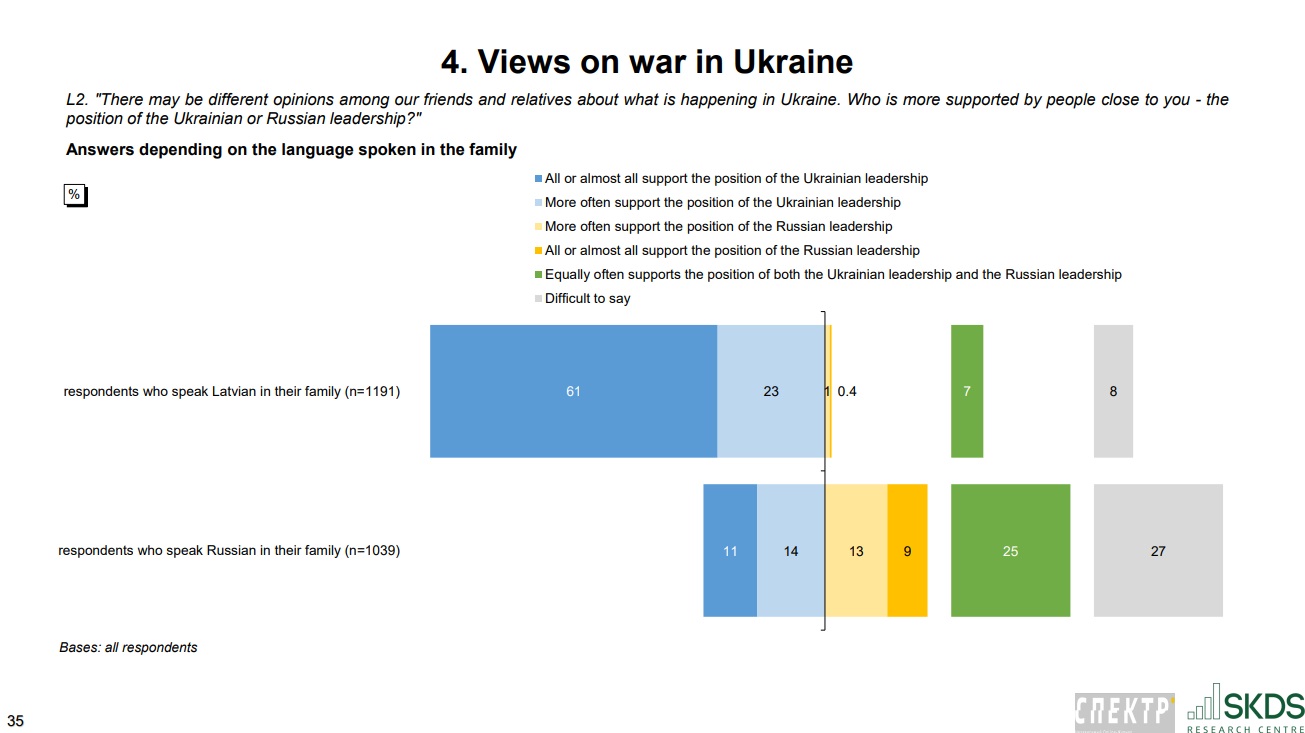
Source: «Research report: risk tolerance of Latvian residents and their attitude towards current events”/ Spektr. Press / SKDS
How to interpret this silence? There is a great temptation to believe that these people are mostly pro-Russian, but they do not admit it, since such an opinion is subject to public censure in Latvia. However, the researchers have no data confirming this hypothesis.
Mārtiņš Kaprāns emphasizes that the cohort of undecided on political and geopolitical issues, which invariably appears from survey to survey, requires interpretation. «I checked on other sensitive issues, for example, about NATO, this is a very stable pattern, it’s not an accident: on one question, «we don’t know», and on the other we have an answer,» says the sociologist. — I would call it sincere indecision. In the context of the pandemic, we talked about vaccination indecision, now we can talk about the indecision of guilt. You can interpret this phenomenon from the point of view of psychology, call it confusion, confusion, I only note the technical fact: these people are hesitating.»
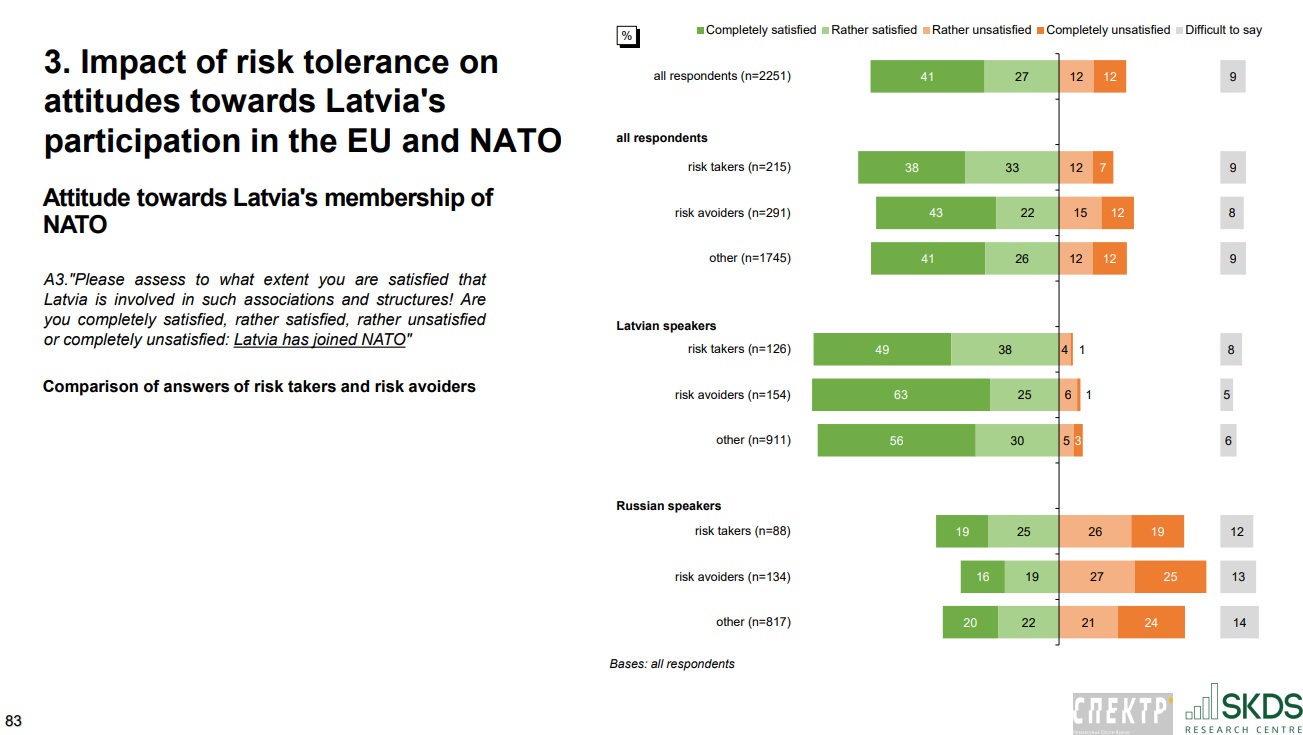
Source: «Research report: risk tolerance of Latvian residents and their attitude towards current events"/ Spektr. Press / SKDS
«It seems obvious that Russian speakers are simply hiding their opinions,» agrees Aivita Putnina. — Does this mean that they may support Russia and Putin, but they don’t say it? It is generally believed that silence is the result of confusion and fright that the Russian-speaking community allegedly experiences. But I think there are other factors as well.»
The researcher is trying to find the key to understanding this situation in the position of the Latvian Orthodox Church. She emphasizes that the church fathers do not necessarily directly forbid the Orthodox to express their position in the world. But the Latvian Orthodox Church has a very interesting position: for the sake of preserving unity, do not lean on anyone’s side. And for this reason, the position of the church leadership is very cautious.
«I think this message should have been conveyed to parishioners at meetings,— says Aivita Putnina. — Even if parishioners have an opinion, they are encouraged not to express it, but o remain silent, so as not to cause strife, schism. And this refusal to discuss some things comes from both sides, especially since there are many ethnic Ukrainians in the Orthodox Church. That is why the Latvian Orthodox Church withdrew from the Moscow Patriarchate. An intermediate position is also a position.»
«I think that we often allow excessive simplification, combining two things: the attitude towards aggression against Ukraine and the destruction of Soviet monuments,» says Juris Rosenvalds. I do not agree with our current president (at that time it was Egils Levits, — not. «Spektr»), who has said that the one having problems with the destruction of the monument (monument to Soviet soldiers in Victory Park — not. «Spektr») is disloyal to Latvia. I think it’s much more complicated. And I would say that we see from the research that Russian families are significantly divided across Ukraine. Perhaps it’s a generational gap issue.»
Rosenvalds believes that it is possible to clarify the true meaning of the silence of this group by creating a system at the state level that will enable to simply talk to them. «I would like to see these efforts on the part of the state, as well as on the part of society,» the scientist says. «Since as a result of the war in Ukraine, we have two communities that are much more divided than before it began.»
Ieva Strode has reminded the audience of a Soviet-era joke: «Don’t think. If you’re thinking, don’t tell. If you’re telling, don’t write. If you are writing, don’t sign it.» She believes that a frank dialogue is hardly possible in the current Latvian society: «In almost every area of your life there is a «good» narrative and «don’t tell». It’s not just about Russian speakers. In the COVID times, many Latvians suddenly found themselves on the «wrong side». And they were unable to act. I think this is a big problem of hesitant respondents. Because there are many persons, who recognize their pro-Russian position, and this is by no means the prevailing narrative. And sometimes I think the waverers don’t even lie. They just don’t think about it. You just haven’t formulated your opinion about some things, you just avoid thinking about it.»
Igor Gubenko admits that it is difficult for him to imagine that a person or an entire social group would be in constant confusion for more than a year. He agrees that confusion was a natural cognitive state of people at the beginning of the war— but not now. «I think these are people from the «not cut and dried» series, says the philosopher. — And I can imagine that this is the real attitude: the belief that both sides have done something wrong and both are responsible for what is happening. But even without taking into account the indecisive 38 percent of Russian speakers in Latvia frankly admit that Russia has defended its interests in Ukraine. I am very unpleasantly surprised: the largest group of Russian speakers supports Russia.»

